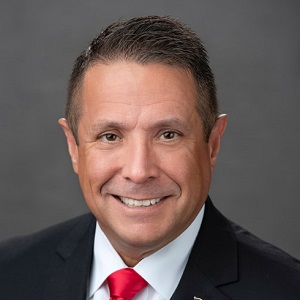In the military they talk about the OODA loop — observe, orient, decide, and act. The faster you can go through that loop, the faster your decisions come out and the more impact you can have.
Anthony Hernandez never planned on a credit union career.
Hernandez spent 25 years in the Air Force, eventually retiring as a full colonel. During that time, one of his many roles was that of an Air Force comptroller, “an Air Force budget officer, kind of like a CFO,” he quips. In that role, he served as a liaison between banks and credit unions with a presence on military installations.

Prior to retirement, an Air Force banking officer introduced him to the Defense Credit Union Council when a job there seemed like a fit for Hernandez’s wife, Jennifer. Tagging along to all manner of DCUC conferences and events, Hernandez gained a broader understanding of the issues military credit unions face, met industry leaders, and more.
In 2016, about six months after his retirement, Hernandez joined DCUC as its chief operating officer. A month later, then-CEO Arty Arteaga announced plans to retire, having led the agency since 2000.
Hernandez became CEO in 2017 after a nationwide search that included 13 qualified applicants and four finalists, including multiple high-ranking retired military officers.
“What helped me was my familiarity with DCUC,” Hernandez says. “I had this big binder of prep material. I took it seriously. I’m that way about everything.”
Today, DCUC represents dozens of credit unions and nearly 40 million members. Here, Hernandez reflects on leadership, the modern financial services landscape, decision-making frameworks, and more.
On the similarities between the military and credit unions …
Anthony Hernandez It’s all about service, right? When you join the military, you’re serving our country. Serving on a credit union staff or in the industry is built on service for the community and service for people.
When I was taking care of airmen under my command I saw a lot of similar stuff to what I see in the credit union world. A lot of the problems center on finances, and that can lead to other problems. If we could take care of those things first, we could head off a lot of other issues.
On effective leadership for defense credit unions …
AH: Every service brings their traditions of leadership. There’s an Army way or a Navy way or a Marine Corps way or an Air Force way; it’s all the same, but there’s little nuances to it.
In the military, they talk about the OODA loop — observe, orient, decide, and act. The faster you can go through that loop, the faster your decisions come out and the more impact you have. It’s like a feedback loop; you get tighter and tighter circles and make faster and faster decisions.
I always trained my airmen that until you’re relieved of command by higher authority, you’re in charge. In the credit union world, staff members are the front line until a manager or a supervisor or a director or VP or even the CEO comes on board. The faster they can observe a financial situation occurring, orient their activity on how to potentially solve it, make a decision, and then act, you can get in that OODA loop and better serve your members.
On differences between defense credit unions and the broader financial services landscape …
AH: A lot of the military lifestyle is unique — it has a lot of different stressors, different benefits, and more. When a member deploys and leaves the family behind, how do we serve military members in a combat zone while also serving those families that are left behind?
Also, everybody in the military has a steady paycheck; they get paid on the first and 15th of the month. That attracts a lot of predatory lenders because they want a piece of that wallet. So realizing that’s there, how do we get those military members? They’re going to find a way to get that 60-inch TV for their dorm room and multiple gaming stations and a nice car. Pretty soon they’re just making the minimum payment and they’re heavily in debt. So those challenges are there.
The other way military credit unions are different is that they have a renewable market — every six weeks or two months, depending on the service. As fast as they come out of basic training. So defense credit unions typically grow a little bit faster than the rest of the industry because it’s a renewable market.
CreditUnions.com’s “On Leadership” series spotlights notable leaders across the credit union landscape by discovering how they joined the movement, learning what makes them tick, uncovering career lessons and successes, and seeking advice for the future of the movement. Read the whole series today.
On the biggest challenges defense credit unions face today and how that differs from decades past …
AH: There’s a lot more competition now — different payment apps, P2P platforms, and a lot more people competing for that tech-savvy generation’s wallet.
One of the other concerns for military credit unions is the cyberthreat and the rise of smart devices. Whether it’s LG or Westinghouse or GE, who’s protecting that data? If you’re a member of a deployment team, whether it’s a Seal Team 6 or some other deployment, and you’re away and your fridge stops ordering groceries automatically because you told it to, now you’ve given away operational details to the enemy.
On the value of intentionality in leadership …
AH: Great leadership means having the right principles and being intentional about stating what you want to do. When the team understands where you’re going and what your intentions are — whether you’re in the military or leading a credit union — people find those opportunities. I don’t worry so much about the results because we’re all pushing forward and those results happen.
This interview has been edited and condensed.